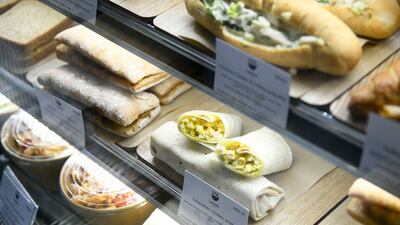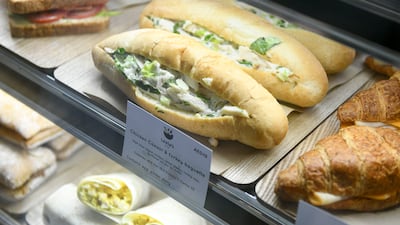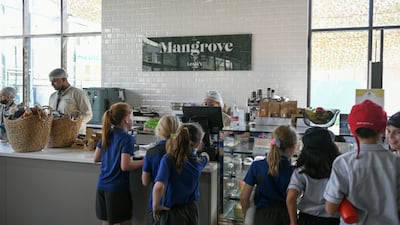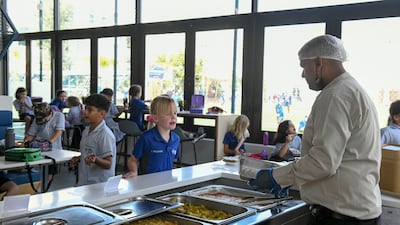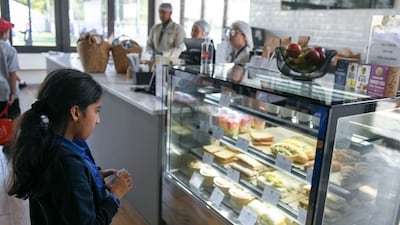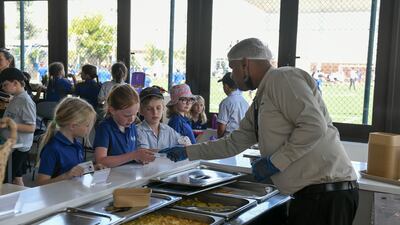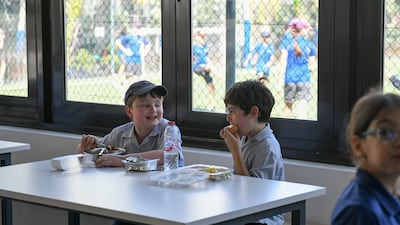School cafeterias in the UAE are serving up healthy meals from berry chia puddings to baked chicken with oat meatballs, and lasagne made from butternut squash and cottage cheese.
Though a cheese croissant or a slide of Margherita pizza may make an appearance, healthy options are readily available daily.
School meals in the UAE are regularly inspected for nutritional value, as authorities in each emirate regulate them while setting standards and outsourcing meals to providers.
With so much progress having been made in the last decade alone, The National sat down with parents, teachers and food providers to discuss what's been achieved and what still needs to be done.
co-founder, chef and nutritionist of Leela’s Lunches
Paul Fowler, managing director of Slices, who provides meals to Gems Education schools, said: “Authorities look at different elements, whether that's looking at the fat content, saturated fat and sugar content, and sodium levels. There are set parameters we operate within.
“We don't have any commercial fryers or deep fat fryers in our kitchens because it's not something we believe is the right thing to be offering on a daily basis.”
Mr Fowler said Slices employs nutritionists who can make sure they cater to fussy eaters, increase fibre levels and cover various dietary requirements.
“It's a holistic approach to provide healthy food and make sure that children have the opportunity to make the right choices,” he said.
“We're making sure we offer a balance between carbohydrates, protein and vegetables.”
Food for thought
In 2017, The National reported that pupils at a school in Dubai were asked about the food served in their canteen and though the menu had healthy offerings such as green salads and lentil soup, one counter sold pastries, muffins and cakes.

Kanika Hughes, co-founder, chef and nutritionist of Leela’s Lunches, who provides meals to schools and nurseries in Abu Dhabi and Dubai, said there had been a mindset shift as healthy meals at schools gain acceptance.
“There has been an attitudinal change. When we started in 2015, the most common refrain I would hear in Abu Dhabi and Dubai was 'why should children be put on a diet? Let them enjoy their childhood,'” said Ms Hughes.
“This was something I had to combat against, and very gently explain to people that having a healthy lifestyle was not a diet or a punishment. What children eat is extremely important because these will be the building blocks for the rest of their lives.
“I would say our food hasn't changed in the last 10 years, but the acceptance of that food has definitely changed. And you can see that in terms of our growing numbers and popularity.”
A sample meal would be beef maqluba (a traditional Arabic dish consisting of beef and vegetable rice) with yoghurt and salad or baked chicken and oat meatballs in a mixed vegetable tomato sauce with mashed potato and steamed vegetables.
“The notion that children’s food has to be separate is very much a modern invention,” Ms Hughes added.
“Our parents never gave us different food, they just gave us whatever they ate.
“We do not differentiate between children’s food and adult’s food. Our food is under-seasoned and we don't use any hot spices, but we build up very quickly to what adult food should be like. We don't want parents to have to cook multiple meals.”
Monitoring meals
Sarah Reynolds, principal at Dubai British School Emirates Hills, said staff keep track of what children who eat packed lunches are bringing to schools.
“We monitor the school lunches,” she said.
“A part of the responsibility of the teachers on lunch is to monitor the nutrition contents of school lunches and if we feel that there's too much sugar, in a child's packed lunch day to day, we would engage with the family and talk with them.”
Parents also say school meals have become healthier in recent years with sensible portion sizes, but more needs to be done to monitor lunches brought from home.
“I believe that the problem in schools is not what the school offers. The problem is that they need to have more control over what the children bring from home,” said Amira Hafez, a British-Egyptian mother of two in Abu Dhabi.
“The schools are giving proper meals such as pasta with chicken or meatballs, rice and chicken or nachos with avocados and salad bowls.
“My daughters have lots of friends who can bring burgers or Nutella sandwiches for lunch.”
Radwa Allabban, British-Egyptian mother of three boys aged seven, 10 and 14, also said schools needed to restrict unhealthy foods sent from home.
“I still see other parents sending a lot of unhealthy snacks with children to school, like chocolate muffins and sugary drinks,” Ms Allabban said.
“I think that in the UAE, there’s more guidelines and proactive school measures to ensure that children eat healthier.
“There’s an alarming rate of obesity among children and adolescents in the UAE and the region, and it is absolutely the right thing to do to make the options available to them at school healthier.”
In 2017, studies suggested that about 34 per cent of children in the UAE were classified as being either obese or overweight.
